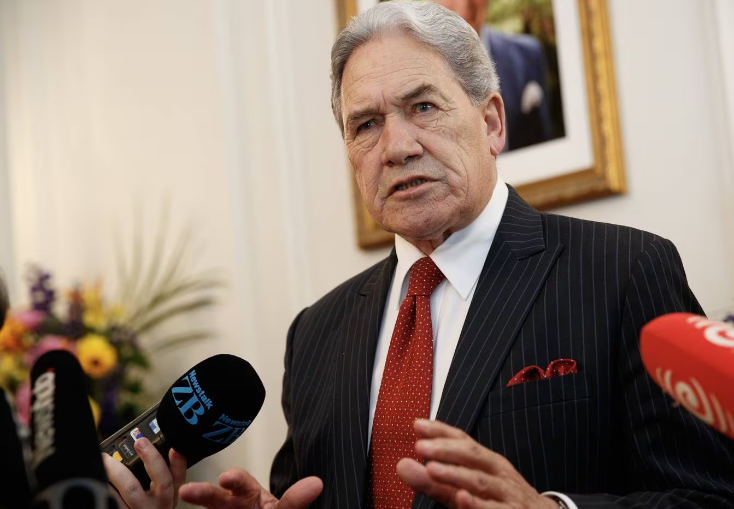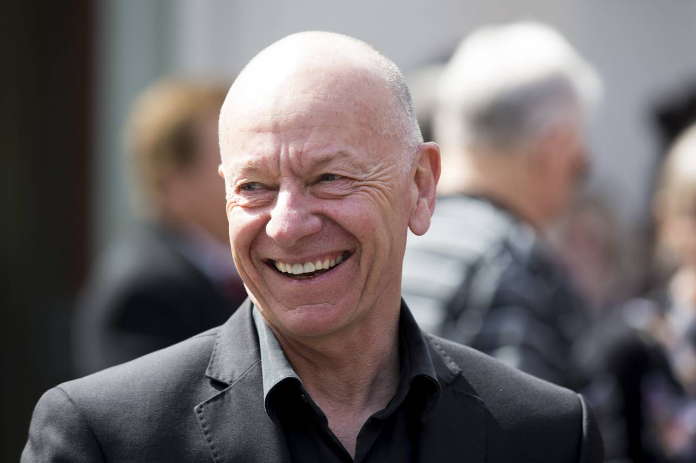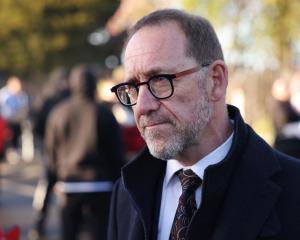
The new coalition government was sworn in at Government House on Monday.
After that ceremony and today, Peters has attacked the media and made inaccurate statements about public funding, including accusations of taking bribes.
NZ On Air board member Andrew Shaw, a screen sector consultant who has previously worked as a television host, posted today on social media: “Winston Peters attack’s independence of media [sic]. He’s not truthful. He’s not accurate. He’s malicious and he is here on behalf of international tobacco. His return is the worst of this gang of thugs.”
After questions from Newshub to NZ On Air about the post it disappeared.
NZ On Air is a Crown entity of the government that funds broadcasting and creative works. Its board members must keep to a code of conduct, which includes political impartiality.
The commission operates largely separate from government policy but must follow directions from the Minister of Broadcasting.

He said he accepted it was the “absolutely the wrong thing to publish” his personal political views and tendered his resignation immediately.
NZ On Air spokeswoman Allanah Kalafatelis said: “The views expressed in the post are those of Andrew Shaw and are not a reflection of the agency’s views. We are a non-partisan agency that has worked constructively with governments of all hues for 34 years.”
Board appointments are made by the minister’s office.
Shaw’s comments came soon after the new coalition government’s first Cabinet meeting got off to a tense start as Peters again accused the media of taking bribes.
Prime Minister Christopher Luxon was asked about Peters’ attacks on the media made at Government House yesterday in which he accused the $55 million public interest journalism fund, a Labour government initiative, of being a bribe to the media sector.
The Public Interest Journalism Fund supported discrete media projects, such as episodes of The Detail podcast, and temporarily funded certain jobs within the media sector, including local democracy reporters, who covered mainly local government in regional New Zealand. NZME, publisher of The Herald, received money from the fund for both projects and to fund roles like local democracy reporters.
“Didn’t see those comments, but I’m excited to get to work with this team here and get things done for New Zealand,” Luxon said.
Peters interjected as Luxon ushered for media to leave and proceedings to get under way.
“Before you go - can you possibly tell the public what you had to sign up to to get the money, it’s called transparency,” Peters said.
Luxon was asked about those comments but did not respond. Fellow Cabinet ministers shuffled awkwardly in their seats.
Peters’ attack on the fund is tied to his criticism of the use of te reo Māori in the media.
“Well, we’ll see the speed at which TVNZ and RNZ - which are taxpayer-owned - understand this new message. We’ll see whether these people, both the media and journalists - are they independent? Well, isn’t that fascinating, I haven’t seen evidence of that in the last three years,” Peters said at Government House yesterday.
“You can’t defend $55 million of bribery, cannot defend $55 million of bribery. Get it very clear,” Peters said.
Applicants to the fund were asked to show a commitment to Te Tiriti o Waitangi, including a commitment to te reo Māori.
Act leader David Seymour has also commented on the issue, saying on Newstalk ZB the Public Interest Journalism Fund (PJIF) had led to the false perception that it distorted media coverage.
He said he personally did not believe the media had been distorted by it, saying $55 million over two years was a very small proportion of overall media revenue and journalists guarded their independence strongly.
“The idea that all the journalists in New Zealand were corrupted by two per cent of revenue to me doesn’t pass the sniff test. But it certainly has created a widespread perception. I’ve heard it many, many times and I think Winston Peters is reflecting what, no doubt, many people have said to him as well as to me.”
He said it was “very silly policy.”
“Probably the worse thing about it was that, whether or not you believe it’s true, for a lot of other people it created the perception that the media had been distorted by public money and the conditions that came with it.
“We need a free and independent press, especially one that is unafraid to hold the government accountable and it should not be taking money from that same government.”
He said RNZ and TVNZ had been set up with safeguards for editorial independence, but the conditions attached to the PJIF, such as adhering to the principles of the Treaty, had made that problematic and led to distrust.
Applicants to the PIJF were asked that when appropriate in producing funded content to support NZ identity, culture and public interest requirements, including support for the principles of Te Tiriti o Waitangi.
However, overriding this in NZME’s funding agreements - a clause specifically requested by the company - is an acknowledgement of the absolute editorial independence of the media entity: “We acknowledge the importance of your editorial discretion as a media entity and confirm nothing in this Agreement will limit or in any way impede or influence the ability of your news reporting functions to report and comment on news stories and current events, including those involving us, as you see fit.”
Appointees to government boards have been under the microscope this year after Rob Campbell was sacked from the Te Whatu Ora board and the Environmental Protection Authority board for taking aim at the National Party over its opposition to co-governance.
Campbell’s departure was followed by a slew of allegations against other government board members, including former Labour ministers Steve Maharey and Ruth Dyson. Maharey was found to have breached impartiality rules too, but kept his job as chairman of ACC, Pharmac and Education NZ.
Then in July, newly appointed RNZ board member Jason Ake quit after making social media comments about the reaction to former Justice Minister Kiri Allan’s resignation and arrest.












